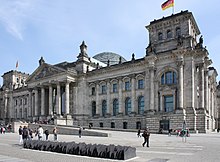Conrad Broßwitz
Conrad Broßwitz (born May 15, 1881 in Danzig ; † March 11, 1945 in Dachau concentration camp ) was a German trade unionist and SPD politician in the Weimar Republic . He was a member of the Reichstag from 1928 to 1930 .
Life
After attending primary school, Broßwitz completed an apprenticeship as a wallpaper and decorator and had been an employee of the socialist labor movement in Danzig , Braunschweig , Schleswig-Holstein and Frankfurt am Main from 1910 . From 1919 to 1933 he was SPD party secretary for Greater Frankfurt and a member of the deputation for science, art and popular education. He acted as head of the cultural cartel of the modern workers' movement in Frankfurt am Main.
In May 1928 he entered the Reichstag for the constituency of Hessen-Nassau , to which he belonged in the fourth electoral term. He left the Reichstag in September 1930.
In 1933 he was first placed in " protective custody ". In August 1944 he was arrested again by the Gestapo in the "Grid" operation and taken to the Dachau concentration camp, where he died in March 1945 - seven weeks before its liberation.
Appreciation
A street in Frankfurt-Bockenheim is named after him, using the spelling “Konrad” (see list of street names in Frankfurt am Main ). Since 1992 one of the 96 memorial plaques for members of the Reichstag murdered by the National Socialists has been commemorating Broßwitz in Berlin near the Reichstag . In 2018 a stumbling block was laid for him in Eschborn . He lived in Eschborn after being bombed out in Frankfurt.
Web links
- Conrad Broßwitz in the database of members of the Reichstag
Individual evidence
- ^ Andreas Rost: Stumbling blocks for Nazi victims laid; in: Frankfurter Rundschau on May 17, 2018, online
| personal data | |
|---|---|
| SURNAME | Broßwitz, Conrad |
| ALTERNATIVE NAMES | Broßwitz, Konrad |
| BRIEF DESCRIPTION | German politician (SPD), MdR |
| DATE OF BIRTH | May 15, 1881 |
| PLACE OF BIRTH | Danzig |
| DATE OF DEATH | March 11, 1945 |
| Place of death | Dachau concentration camp |
